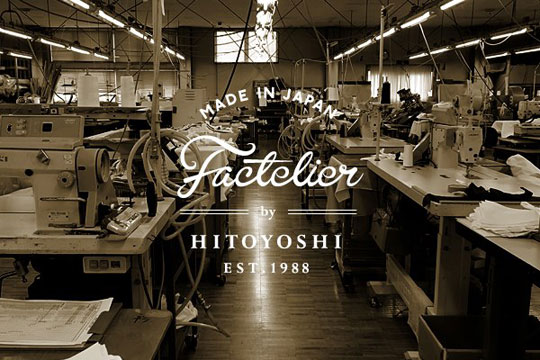
Japanese techniques of making clothes are popular in the world top brands; GIORGIO ARMANI got silk made in Kawamata, Fukushima. CHRISTIAN LACROIX used organdie made in Ishikawa for ballet costumes for Opera House in Paris.
Even Japanese techniques have been valued in the world, the number of clothes made in Japan have decreased its domestic share from 50.1% to 4.5% in 10 years. It is the result of prolonged depression and being low-cost.
A lifesaver of clothes made in Japan is Toshio Yamada, who established “Factelier.” It is an online shopping service, that provides top-quality and well-designed products minimizing one’s cost. The secret of low cost is to connect factories to customers directly without any middlemen.
Factelier started working with “HITOYOSHI,” shirts factory for famous domestic and international brands. Hiroaki Maeda and Koichi Sato from HITOYOSHI, and Toshio Yamada from Factelier discussed about “made in Japan.”

left: Mr. Yamada, middle: Mr. Maeda, right: Mr. Sato
Sato worries about the future of clothes made in Japan.
There are not so many young artisans because they do not have an exact image working in a factory. I expect the number of factories has been down by half in five years. To avoid this situation, we, HITOYOSHI, go to schools to show students the production of shirts and hope youngers get become professionals in this industry.

Maeda tells what is “made in Japan” for himself.
I would say “made in Japan” represents Japaneseness which is able to be earnest and concentrate on one thing. The more Japanese professionals pursuit high technique for making shirts, the more that technique becomes sophisticated.
Finally, Yamada says about what is a “good” thing.
People have different definition of “good,” so we are trying to tell our good products with truth and provide a chance to think about what is “good” for yourself. I have a dream, people would choose products with warmth of producers and their quality no matter brands. Anyway, as long as we have valued techniques and factories, we want to share values that “made in Japan” has.
Nowadays, there are tons of clothes around us ranging from high-brands to fast fashion. This gives us to enjoy choosing what we wear everyday, but we lose chances to meet “good” clothes at the same time. Why don’t you pick “made in Japan” up yourself and feel how different from other clothes that you always wear? You do not have to answer what’s “good,” just feel it!!
[via Greenz.jp written by Hitomi Ito]
[English Text by Miyu Murofushi]
NEXT ACTION
Factelier – LOHAS COUTURE
http://www.lohascouture.com/en/made-in-japan/factelier.html

